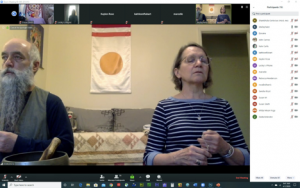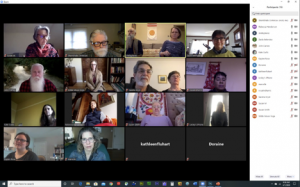Monday
Community ArticlesTransitioning to Zoom
By Craig Sargent
When One Door Closes, Another Door Opens
Due to COVID-19, we closed our Center in Lexington KY on March 14th. Broken hearted, we purchased a Zoom Pro account later that day, and began our transition to Zoom. We held our first Council meeting in Zoom two days later and began offering group meditation sessions later that week.
While we all are sheltering at home, we are scared. People we know have tested positive for COVID-19; people we know have died from COVID-19. We yearn to stay connected with each other, to practice together, and Zoom gives us a vehicle to do that. Just by seeing each other’s smiling faces, our facial expressions soften, our eyes well with tears, and we feel each other’s open hearts. Our online practice sessions feel as powerful as they do when we all meet live in our Center.

Shastri Shelley Heinz leading a White Tara practice session
Now, we have a palette of offerings online. Our free weekly offerings to the public include: White Tara three times per week, Qigong Basics twice per week, and Café Shambhala once per week, each led by someone from their own home. Our last White Tara and Café Shambhala sessions each had roughly 20 participants. We held a Yoga workshop last weekend, and soon will be offering two Shambhala Online classes through Zoom (Shambhala Online Letter).
Getting Started in Zoom

Gallery view of our White Tara practice session, after dedicating the merit
Zoom is versatile and works well with PCs, Macs, tablets, and smart phones (System Requirements for PC, Mac, and Linux, System Requirements for iOS, iPadOS, and Android). We bought a one year Zoom Pro account for $149.90 and set it up in my name with one of our Center’s email addresses. I already have some experience with Zoom through teaching online at my university. Zoom’s technical support pages are excellent, and John David Smith’s (Portland) Super Easy Guide to Zoom is very helpful for beginners. Cynthia MacKay (Los Angeles) and John David Smith have been holding Zoom calls to help Centers transition to Zoom, and are compiling and sharing resources in an online document: https://docs.shambhala.info/zoom/overview, which will be updated frequently.
If you are new to Zoom, once you have your account set up, login with your account’s email address and password. Have a few sangha friends on standby, schedule your first meeting, email them the link, and start the meeting. Then play with the simple settings: gallery view or speaker view, participants, chat, share screen, record, breakout rooms (while consulting the Super Easy Guide to Zoom). Explore what meditating together feels like, what giving a talk feels like. Try using share screen to share a prerecorded video (from YouTube or Vimeo), a photograph (e.g. a thangka, a shrine), a document, some slides. As you become comfortable with the medium, offer to help others do the same, especially teachers.
Streaming Videos
If you are using Zoom to screen share a video from a Shambhala Online class, we have found that this works best if the video resolution is set to 480. Participants in homes with slow internet connections may not be able to stream HD videos.
When in Doubt, Mute
When chanting or reciting a liturgy, have everyone on mute except the umdze. Each of our mics is a little out of phase with everyone else’s mic, which makes for a garbled audio if we all chant together unmuted. Not a good medium for sing-alongs either.
Who Should be the Host?
When hosting a group meditation session or a class, the host wears several hats: Coordinator, Gate Keeper, A/V Geek, and Kasung on duty, in case you need to remove a participant (e.g. a troll). Keeping track of all of that may be too much to ask of your teacher. Typically, a teacher or umdze holds the lungta for the container, while the staff deals with issues as they arise. I suggest letting your teacher teach, while the host keeps things running smoothly from the background.
What About Alternate Hosts?
If one person hosts everything that your Center offers in Zoom, they may become overwhelmed. Zoom licenses are for individual people, so if your Center has an account for one host (as ours does), then you cannot assign an alternate host in your account settings. There are some workarounds. If your meeting is small and does not need a host, then you can set it up so that participants may join before host (Enable join before host), which will enable them to meet without you. In this case, no one will have hosting functions, and that may be fine for some situations. You can assign a co-host once a meeting has started and pass the hosting baton to someone else, or a designated co-host may be able to claim host with a host key as they join the meeting (https://docs.shambhala.info/zoom/account_mangement). Another constraint of having an account with one host is that you cannot set up two or more meetings at the same time. Some Centers have paid extra to have more than one host in their organization. Other Centers have sangha members with personal Zoom Pro accounts, who offer to schedule small meetings and social events for their sanghas.
What About Security?
A recent phenomenon is trolls invading zoom meetings. Although I’ve not heard of this happening in Shambhala, there are some commonsense measures we can take to protect ourselves. Share your zoom links only with your intended audience and don’t post them in social media. In your account settings, consider setting share screen to host only, disabling the setting that allows removed participants to return to the meeting, and disabling the setting that allows participants to share files. Other security measures include not letting participants join a meeting before the host or having them in a waiting room until you get there.
Zoom and Beyond
What will we do with our Zoom account once our Center reopens? One pattern I’ve noticed already is that Zoom has expanded our geographic reach. Sangha members who live one or two hours away are more likely to attend White Tara or Café Shambhala when they are in Zoom. And we have had participants from other states join some of our Zoom sessions as well. I am visualizing hybrid offerings in our future.
 Craig Sargent has been a student of Shambhala since 1993 and has been teaching classes in Shambhala Buddhism since 2005. Currently, he is Center Director for Lexington KY. His passions include being outdoors and creative expression through photography and videography. He has been a full-time Biology professor at the University of Kentucky for the past 35 years, and has been a part-time videographer for the past 8 years for the Lexington Ballet, the School for the Creative and Performing Arts, the Lexington Shambhala Center’s concerts and art openings, and the University of Kentucky’s Ecological Research and Education Center.
Craig Sargent has been a student of Shambhala since 1993 and has been teaching classes in Shambhala Buddhism since 2005. Currently, he is Center Director for Lexington KY. His passions include being outdoors and creative expression through photography and videography. He has been a full-time Biology professor at the University of Kentucky for the past 35 years, and has been a part-time videographer for the past 8 years for the Lexington Ballet, the School for the Creative and Performing Arts, the Lexington Shambhala Center’s concerts and art openings, and the University of Kentucky’s Ecological Research and Education Center.





Apr 15, 2020
Reply
Thanks Craig for the tips on using zoom. For us in Annapolis Royal, NS, having this way to connect has been a great blessing – we do long check-ins; everyone wants to share. Practising together in zoom seems to work well, we can feel the strength of community. We also have found people who would never be able to drive to Sunday sittings have entered our new virtual shrine room.
Apr 8, 2020
Reply
Great article, Craig. I have been dragging my heels on connecting…happy the chance is there when I get ready.
Apr 7, 2020
Reply
Yes, I think it would be great to have Café Shambhala on Zoom as well as onsite. We have so many out of town/state members, and former members who would like to join in from time to time. (Hi, Cincinnati group!)